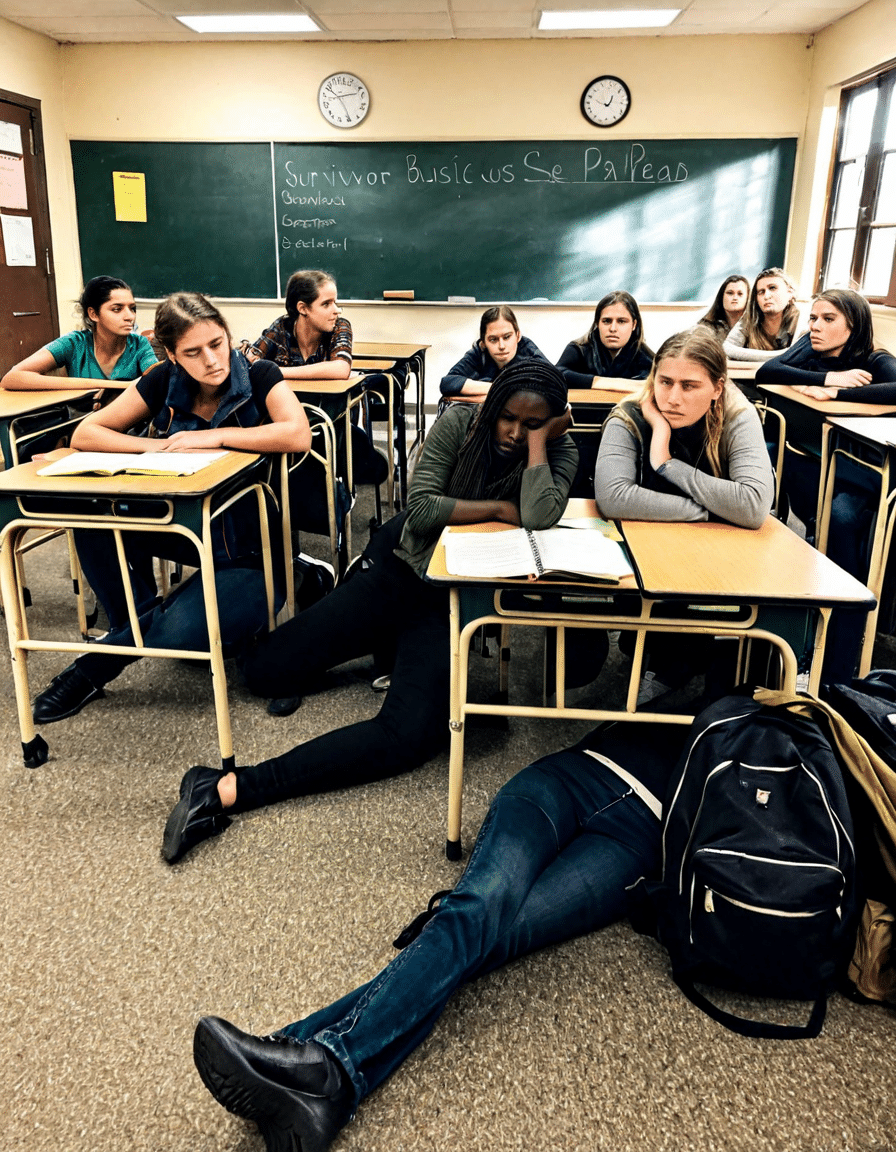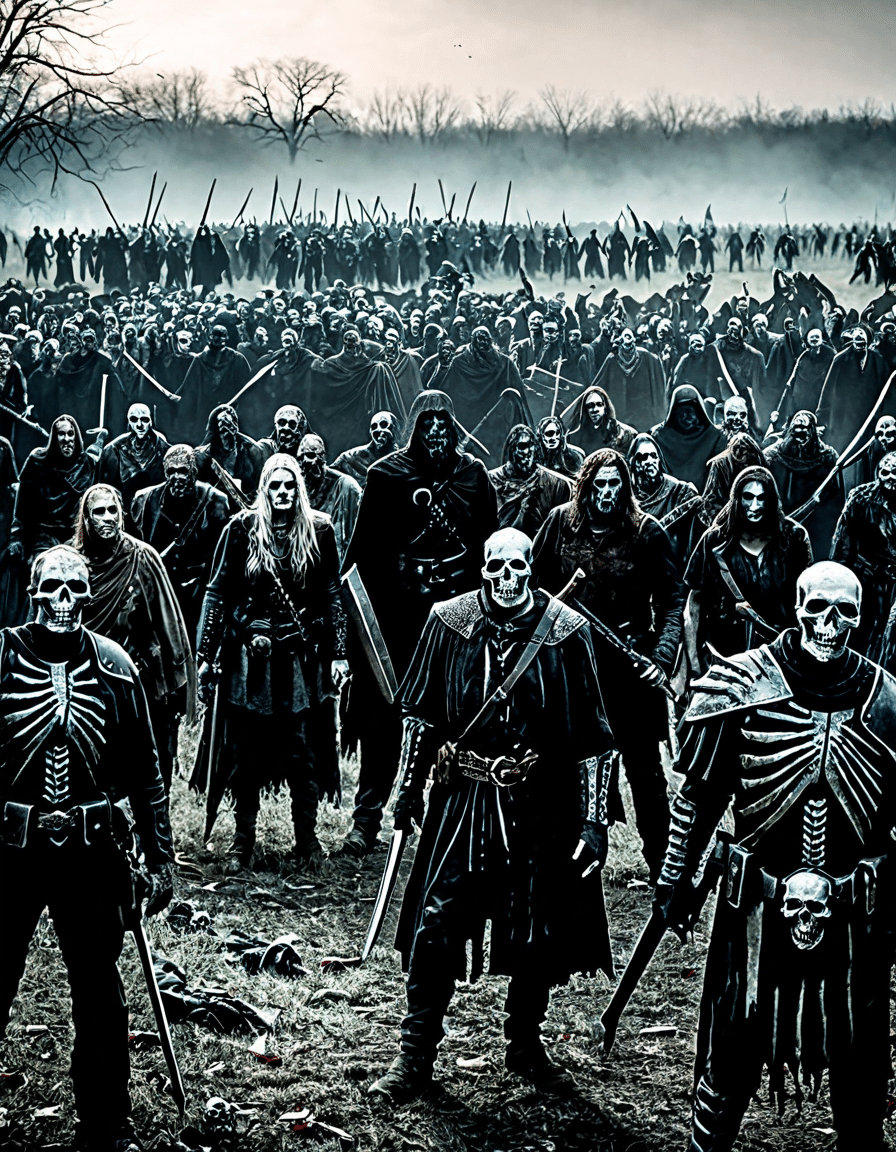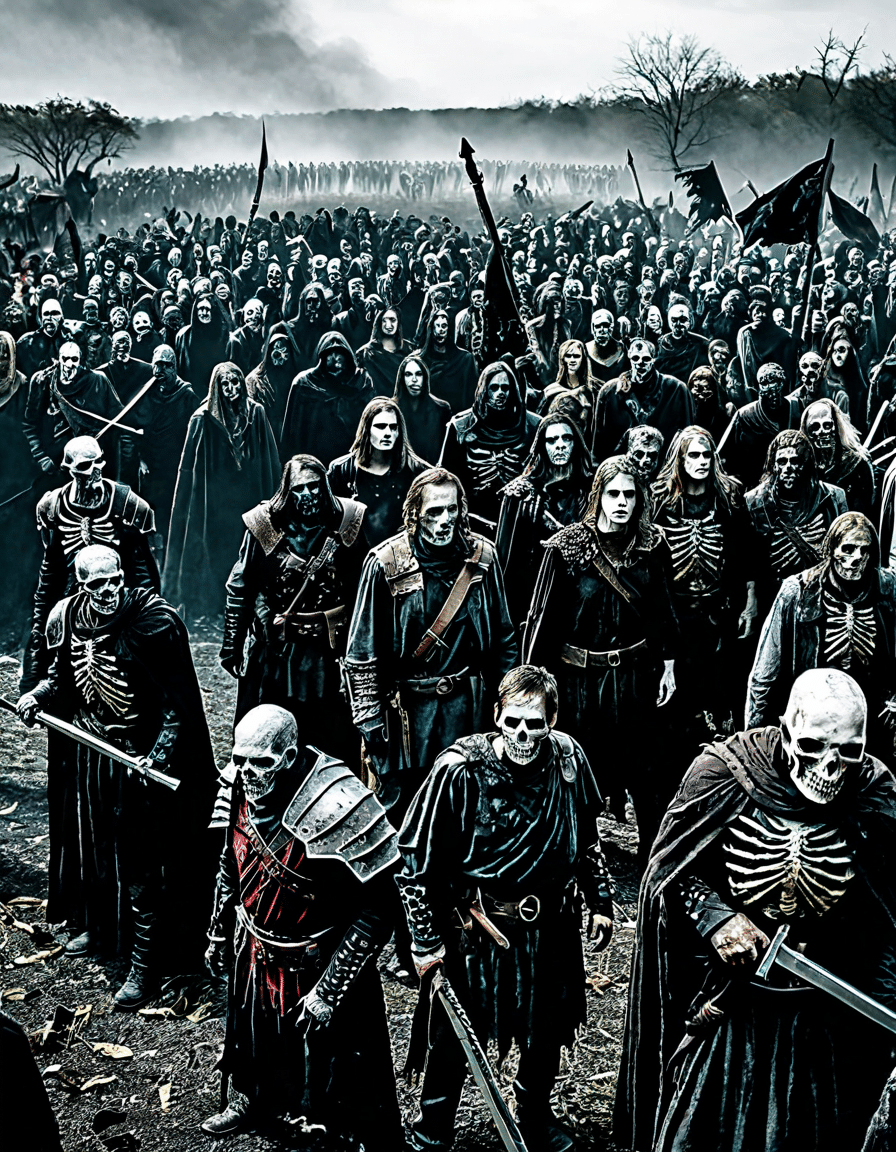As audiences continue to dive into the themes of survival and humanity’s fragility, All of Us Are Dead has carved its mark as a recent landmark in the realm of zombie narratives. This show beautifully marries the rich storytelling tradition often found in Korean cinema with the heart-pounding thrills that make zombie content so enticing. It hits home for viewers far beyond its cultural origins, making it a talking point among movie enthusiasts and casual viewers alike. So, grab your popcorn, and let’s explore what makes All of Us Are Dead such a standout in the crowded zombie genre, as we compare it to The Last of Us—both the groundbreaking game and the riveting series.

7 Key Themes That Make All of Us Are Dead Stand Out
1. Survival Against All Odds
At the heart of All of Us Are Dead lies the intense struggle for survival, echoing the gripping journey found in The Last of Us. In both narratives, characters face the relentless threat of the undead, grappling not just with the monsters outside but also with their own fears and doubts. The stakes are sky-high, pushing them into gut-wrenching decisions that weigh heavily on their humanity. Think about it: watching these characters battle for life reminds us of our own fears in precarious situations.
2. Character Depth and Development
Where many zombie narratives stumble, All of Us Are Dead and The Last of Us soar—thanks to their intricate character development. The ensemble cast of All of Us Are Dead boasts diverse individuals grappling with their own struggles, trauma, and relationships. This profound character complexity allows audiences to connect with their journeys, akin to the beautifully crafted arcs in The Last of Us. It’s relatable, and in a world rife with horror, it’s uplifting to see human connections develop even amidst chaos.
3. Social Commentary
All of Us Are Dead cleverly weaves in social commentary that resonates with real-world issues, much like The Last of Us. It tackles themes like peer pressure and the tumult of adolescence, presenting a mirror to society’s fragility. Both shows utilize horrific scenarios to reflect on human behavior under duress, offering a thought-provoking critique on the dynamics of modern life. Who would’ve thought a zombie apocalypse could bring so much introspection?
4. Innovative Cinematography and Direction
The visuals in All of Us Are Dead are nothing short of spectacular, with kinetic camera work that captures the pandemonium of a zombie apocalypse. This approach adds a rich layer to the storytelling and immerses viewers in the experience. It’s reminiscent of the environmental narratives found in The Last of Us game, where every moment feels like it’s loaded with meaning and history. You can almost feel the tension as you watch characters dart through narrow hallways, their panic palpable onscreen.
5. Cultural Accessibility
The global reach of All of Us Are Dead illustrates a larger trend in cinema—a celebration of cultural diversity in storytelling. This show’s appeal transcends language and region, just like the impactful journey of The Last of Us, which captured audiences who might have never picked up a game controller. It showcases how universal themes—fear, love, survival—can resonate across different cultural landscapes. Talk about leveling the playing field!
6. Emotional Resonance
What elevates All of Us Are Dead beyond mere thrillers is its emotional depth. The narrative dives into profound themes of loss, regret, and connection, making it relatable even during fantastical situations. This emotional backdrop mirrors the deep currents running through The Last of Us, where each character carries the weight of their past. It’s not just about fighting the undead; it’s about human emotions in a world that’s unraveling.
7. The Power of Community and Teamwork
All of Us Are Dead shines a light on the necessity of collaboration and teamwork in adverse times. Characters must come together, facing their own demons and the undead to survive. This theme stands in contrast to the sometimes solitary journeys in The Last of Us, offering a fresh perspective on survival. It’s a reminder that in the darkest of times, community can be the most powerful weapon against despair.

Exploring the Lasting Impact of All of Us Are Dead
The phenomenal success of All of Us Are Dead reflects a transformative trend in zombie narratives. It embodies the shift from portraying survivors as mere victims to showcasing individuals reclaiming their agency amidst chaos. In previous depictions, zombies served merely as antagonists, but All of Us Are Dead reframes the narrative—presenting character arcs that resonate deeply with the emotional journeys in The Last of Us.
Both shows provide insights into how societal structures collapse during crisis, prompting viewers to reflect on their own lives. By depicting adolescents navigating zombie-infested landscapes, both series invite us to consider the relationships and decisions that define who we are in times of distress.
Final Thoughts: A New Era of Zombie Storytelling
As viewers eagerly crave content that captures the essence of survival, All of Us Are Dead shines brightly in a saturated genre. It’s more than just another zombie show—it offers thrilling escapism while delving into deeper emotional themes. The comparisons with The Last of Us emphasize a significant evolution in storytelling, moving past conventional horror motifs to explore complex human experiences.
In an age where narratives touch on existential crises as much as they entertain, All of Us Are Dead and its peers set exciting precedents for embracing complexity in fear and resilience. More than just a bite of horror, these stories invite us to ponder what it really means to be human when faced with overwhelming odds, much like the emotional stories of other media like Welcome To Derry or the Jfk Jr documentary analysis. It’s safe to say that zombie storytelling has entered a promising new chapter, and we’re all eager to flip that page.
All of Us Are Dead: Fun Trivia and Interesting Facts
The Zombie Phenomenon in South Korea
“All of Us Are Dead” has taken the world by storm, showcasing a gripping tale of survival amidst a zombie apocalypse. Did you know that the series is based on a popular webtoon titled “Now at Our School”? This comic has been a massive hit in South Korea, drawing in fans for its thrilling elements and character-driven storytelling. Just like how eyelid dermatitis can pop up unexpectedly, the show’s shocking moments catch viewers off guard, delivering a fresh take on the zombie genre.
Adding to the show’s authenticity, many students in the series find themselves trying to navigate their surroundings much like a traveler might when exploring a desert. The stark contrast between the once-bustling school life and the eerie silence after the outbreak mirrors the harshness of survival in an empty landscape. Plus, the relatable high school dynamics—filled with friendships and rivalries—add a layer of depth that viewers can connect with on a personal level.
Behind the Scenes and Inspirations
Moving on, have you ever wondered about the music behind the show? The creators pulled from various genres to set the tone, tapping into artists like Vince Staples to provide a modern flair. His unique sound complements the high stakes and tension felt throughout the series, lending an urban vibe that keeps audiences drawn in. Additionally, outside of the action, some fans have been curious about the actors’ lives, including who’s dating whom. For instance, the question “who is Jack Doherty’s girlfriend? has sparked a lot of interest, showcasing how stars lead lives just as dramatic as their characters.
Furthermore, the show’s production faced its share of challenges, much like the twists faced by characters within “All of Us Are Dead.” Filming took place in various locations, but the tight life crew had to creatively manage their space, reminiscent of how residents in Biloxi, MS, adapt and thrive in their community. This parallel is fascinating, considering how both scenarios involve resilience in the face of adversity.
Impact on Pop Culture
The popularity of “All of Us Are Dead” has positioned it as a significant player in global pop culture. As viewers binge-watch, they’re not just catching a zombie flick; they’re diving into broader discussions about humanity, survival, and ethical dilemmas. Interestingly, the portrayal of various Spider Man Villains in different adaptations can be likened to the layered character arcs in the series, where traits and motivations are explored beyond just the horror. This deep exploration keeps fans coming back for more, making it a pivotal experience in contemporary television.
In conclusion, “All of Us Are Dead” isn’t just another zombie story; it’s a compelling narrative about hope, teamwork, and the human spirit. With so many engaging elements woven into its fabric, it’s no wonder audiences are hooked, eagerly waiting to see what happens next. As the saga unfolds, it ushers in a new era of thrillers that resonates worldwide, much like the changing tides of life reveals stories like those of esteemed hotel venues, such as the Raleigh Marriott city center, thriving amidst every challenge.





